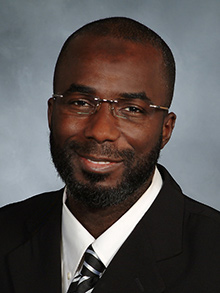Babacar Cisse, MD, PhD, has been awarded a Department of Defense grant to investigate how transcription factors regulate the development, function, and maintenance of microglia in glioma. The highly competitive Career Development Award is intended to support early-career cancer investigators as they conduct innovative studies under the mentorship of an experienced researcher. The three-year, $400,000 award will support Dr. Cisse’s novel work as he first investigates the normal development and function of microglia from embryonic to adult stages, followed by the use of mouse models to investigate the disruptions in their function known to exist in gliomas. He will work under the mentorship of Dr. Selina Chen-Kiang, professor of microbiology and immunology and professor of pathology and laboratory medicine.
Microglia are immune-system cells that are distributed throughout the central nervous system, where they detect threats and mount an effective response. The regulation of the development and function of microglia by transcription factors is poorly understood, as is the interaction of microglia and neoplastic cells in the glioma microenvironment. A better understanding of the transcriptional regulation of microglia could play a role in the development of anti-tumor immunotherapies. Dr. Cisse’s project, “The Role of Basic Helix-Loop-Helix (bHLH) Transcription Factors in Glioma-Associated Microglia,” is designed to study how CNS resident microglia are regulated. “This may not only lead to new discoveries in the biology of microglia,” says Dr. Cisse, “but it will also give us insight into how gliomas interact with microglia during glioma formation and progression and hopefully pave the way for the identification of novel and less toxic therapeutic targets.”
“This award is a great validation of Dr. Cisse’s work,” says Dr. Philip Stieg, chairman of neurosurgery and neurosurgeon-in-chief of NewYork-Presbyterian/Weill Cornell Medical Center. “We are in an extremely competitive funding environment right now, and only top-scoring proposals receive these awards. The goal is to support new discoveries, and in a field that’s advancing as quickly as immunotherapy it is critical to have investigations like these. We are honored to get the grant, and we look forward to what findings come out of this work.”
Gliomas are the most common type of brain tumors, which cause an estimated 13,000 deaths each year in the United States. They are complex microcosms and differ in location, morphology, tendency, progression, and response to therapy. The interaction between tumor cells and their environment is thought to influence tumor development, progression, and response to therapy. “This study,” says Dr. Cisse, “may not only lead to new discoveries in the biology of microglia, but it will also give us insight into how gliomas interact with microglia during glioma formation and progression and hopefully pave the way for the identification of novel and less toxic therapeutic targets.”


